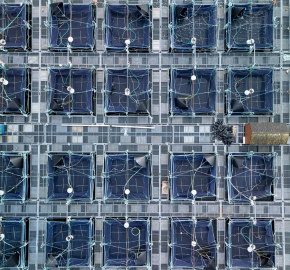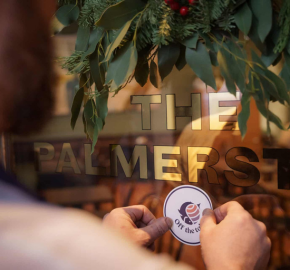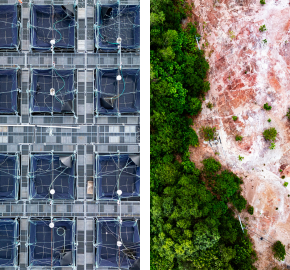Grotesque footage emerges from certified Scottish salmon farm as new report questions whether consumers are being misled by certification bodies and supermarkets
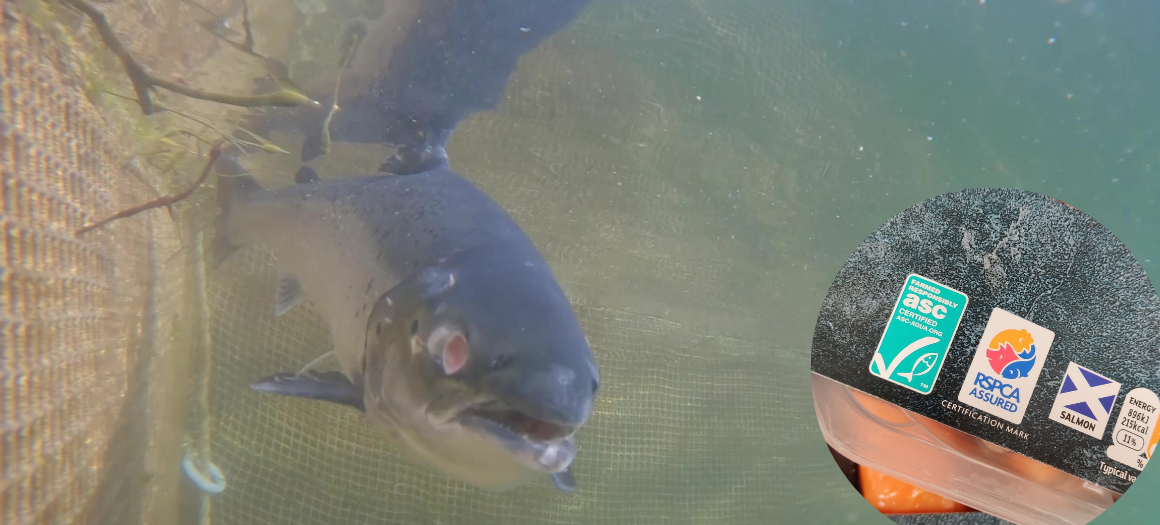
A new report from WildFish finds salmon farms are certified by leading bodies despite substantial marine pollution, inadequate parasite control and monthly mortality rates as high as 74%. [1] Recent footage from a certified farm shows salmon suffering from deformity and disease.
Schemes such as Aquaculture Stewardship Council (ASC) and RSPCA Assured are potentially misleading consumers on the environmental and welfare credentials of certified farmed salmon, the new report finds.
The report, Responsibly farmed?, investigates certification bodies ASC, RSPCA Assured and Soil Association Organic, and finds numerous examples of how certification of Scottish salmon requires lower environmental and welfare standards than could reasonably be expected by consumers.
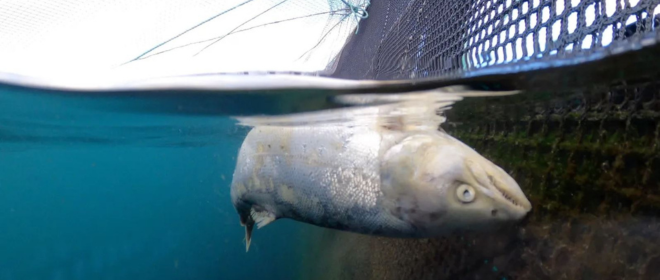
Photo caption: a dead Scottish farmed salmon.
For example, RSPCA Assured, which claims to set “higher farm animal welfare standards”, specifies no limit on the maximum number or percentage of fish dying on its certified farms. As a result, farmed salmon originating from farms reporting mortality rates as high as 74% can be sold with an RSPCA-assured “high welfare” label in supermarkets across the UK. [2]
Additionally, the report documents numerous examples of farms breaching the standards required by its certification, but remaining certified – including four salmon farms which breached ASC sea lice limits earlier this year, but did not lose their certified status. Salmon from these farms can still be sold as ASC-certified.
The report’s release comes as new undercover footage has emerged, taken in June this year, which shows salmon suffering from deformities and disease on a farm run by Norwegian giant Mowi, which has ASC and Soil Association Organic certification. The farm may also be RSPCA Assured; Mowi has previously stated that its “Scottish operations are 100% certified against the RSPCA (Royal Society for the Prevention of Cruelty to Animals) standard”, but RSPCA Assured does not publish a list of certified farms.”[3]
Watch the Undercover Footage
It seems unbelievable that RSPCA Assured and ASC can endorse and certify farms where more than half of fish die prematurely from disease or parasite infestation over a production cycle, or where farms have clearly breached the requirements designed to protect both farmed and wild fish welfare.
Rachel Mulrenan
Scotland Director, WildFish
Rachel continued: “this latest footage of deformed and diseased salmon is clearly worlds away from what customers expect when they pay a premium for certified fish, particularly given that some supermarkets advertise that these accreditations are some sort of guarantee that fish have been raised to the highest standards. Certification bodies and supermarkets have a fundamental duty not to mislead customers on the reality of farmed salmon, but it appears they are failing dismally on this”.
The report explores the requirements of the three certification schemes across a number of different environmental and welfare indicators, such as permitted mortality rates, use of chemical pesticides and sea lice limits, and documents a number of case studies where farms have breached the requirements, with no loss of certification.
In February 2023, ASC introduced its updated Salmon Standard, which included a five-fold increase in the number of sea lice permitted on its certified farms. Sea lice infestations proliferate on salmon farms across Scotland and other salmon-producing countries. These parasites cause huge welfare issues for the farmed salmon, eating the fish alive, and can transfer to wild fish in the surrounding environment. For juvenile wild salmon migrating to sea, these lice can be fatal.
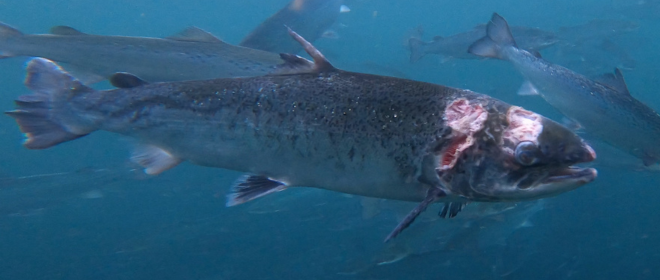
Photo caption: Scottish farmed salmon with severe sea lice damage. ©CorinSmith
The move by ASC to relax its rules on sea lice levels was accompanied by an apparent strengthening of its enforcement. ASC stated that breaching and failing to rectify sea lice levels, would result in the salmon from the relevant farm becoming “not eligible to be sold as certified and the certificate shall be cancelled.[4] However, WildFish contacted ASC in relation to four farms that had breached the standard, and was informed that the standard has a ‘veterinary exemption’ clause, which had been applied. All four farms remained certified.
The report also explores how RSPCA Assured, ASC and Soil Association Organic certifications fall short of the environmental and welfare standards that consumers might reasonably associate with them.
One example case study is the permitted use of chemical pesticides on Soil Association Organic certified salmon farms. The report details one organic certified farm applying multiple treatments with the chemical pesticide Deltamethrin. Due to the open-net structure of salmon farms, after use the pesticide is released into the surrounding water, damaging the seabed health, and potentially killing lobsters up to 39km² from the farm.[5]
On the welfare side, the investigation found that none of the three certification bodies sets a maximum level for permitted mortalities. Scotland’s salmon farming industry suffered record mortalities in 2022, reporting a record 16.7 million premature deaths on farms; nearly double that of the previous year. As of July 2023, 3.8 million more fish had died prematurely on Scotland’s salmon farms than during the same period in 2022.[6]
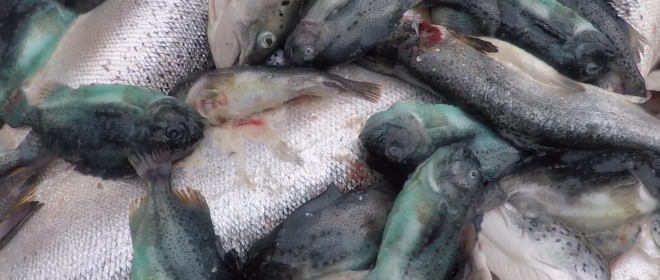
Photo caption: dead farmed salmon and cleanerfish (Lumpfish) on a Scottish salmon farm.
Ms Mulrenan added: “Our research found that, contrary to what the industry says, these are not one-off incidents of breaches of standards – the breadth of examples we encountered, both in relation to environmental and welfare standards, indicate a systemic failing of certification schemes such as RSPCA Assured and ASC to both implement meaningful requirements, and then to enforce these.
“ASC’s own research shows that certification schemes are consumers’ most trusted source of information about the sustainability of the fish they are buying.[7] If these schemes aren’t going to properly hold the industry to account, then their existence risks being little more than a greenwashing operation. If they are to be credible, certification schemes need to be proactive, rather than reactive. Currently that is certainly not the case.”
Read the reportList of References
- https://www.salmonscotland.co.uk/reports
- https://www.gov.scot/publications/fish-health-inspectorate-mortality-information/
- See footnote
- https://www.asc-aqua.org/wp-content/uploads/2022/09/ASC-Salmon-Standard-v1.4-Final.pdf
- https://www.sciencedirect.com/science/article/pii/S0269749120302451
- https://www.gov.scot/publications/fish-health-inspectorate-mortality-information/
- https://www.asc-aqua.org/news/latest-news/most-comprehensive-asc-consumer-research-to-date-highlights-potential-of-seafood-to-be-sustainable-source-of-protein/
Footnote
[3] The footage was filmed at Invasion Bay on Friday 2 June 2023.
Invasion Bay is operated by Mowi Scotland. The salmon farm received ASC certification in December 2021 which is valid until December 2024 (https://asc-aqua.org/find-a-farm/ASC01727/); it is listed on the Soil Association website as holding Organic certification (https://www.soilassociation.org/certification/check-for-organic-certification/organic-certificate-checker/)). RSPCA Assured does not publicly list its certified farms, but in 2019, Mowi stated that “[its] Scottish operations are 100% certified against the RSPCA (Royal Society for the Prevention of Cruelty to Animals) standard” (https://mowi.com/uk/wp-content/uploads/sites/15/2019/03/Letters-Word.pdf); on the Mowi UK website the company states: “We’re regularly checked by RSPCA’s independently certified farm assurance scheme and are proud to meet their standards” (https://mowisalmon.co.uk/about-us/).

